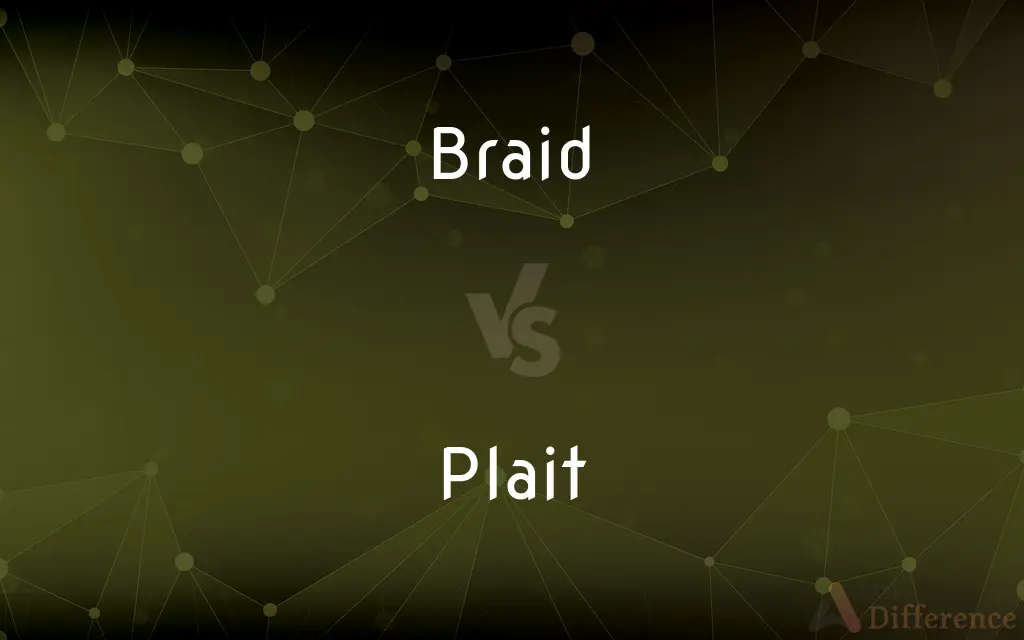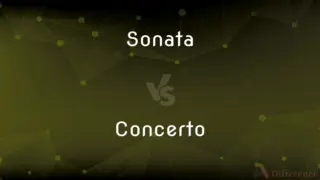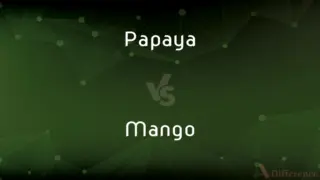Braid vs. Plait — What's the Difference?
By Tayyaba Rehman — Updated on September 3, 2023
A braid and a plait refer to the intertwining of hair or other materials, with "braid" being the preferred term in American English and "plait" in British English.

Difference Between Braid and Plait
Table of Contents
ADVERTISEMENT
Key Differences
Both braid and plait denote the action or result of intertwining hair, fibers, or other materials. The terms can often be used interchangeably, especially when referring to hair. For many, a braid involves taking three sections and interlacing them in a specific pattern, while a plait might conjure a similar image.
In the United States, the word braid is more commonly used, and it's the prevalent term in the American lexicon. You'll hear people discussing braided hairstyles or even referring to objects like braided ropes. The word has Norse origins, coming from the word "breida," meaning "to pull, draw, or make by interlacing."
In contrast, in the UK and other English-speaking countries, plait is the preferred term. When discussing hairstyles or the intertwining of materials, a British person is more likely to use "plait" than "braid." The word "plait" comes from the Old French word "plett," meaning "to fold."
Despite these regional preferences, in modern global contexts, the distinction between braid and plait has blurred due to media, travel, and the interconnectedness of cultures. Regardless of the term used, the underlying concept remains largely the same: an interwoven pattern of materials or hair.
Comparison Chart
Preferred Region
Primarily used in American English
Primarily used in British English
ADVERTISEMENT
Origins
Norse origin ("breida")
Old French origin ("plett")
Usage in Context
Common in hair styling and craft materials
Common in hair styling and craft materials
Number of Strands
Typically involves three or more strands
Typically involves three or more strands
Synonymy
Often used as a synonym for plait
Often used as a synonym for braid
Compare with Definitions
Braid
A patterned formation by intertwining three or more strands of hair or fibers.
She wore a beautiful braid down her back.
Plait
A single length of hair or other material made up of three or more interwoven strands.
She had a long plait that reached her waist.
Braid
A group or cluster, often used metaphorically.
They were a tight braid of friends, always seen together.
Plait
A type of bread or pastry that has been folded in interwoven layers.
She baked a delicious plait filled with cinnamon and sugar.
Braid
A decorative band or edging made of interwoven material.
His uniform had a gold braid on the sleeves.
Plait
A complex situation or a multifaceted challenge.
The mystery was a plait of clues and red herrings.
Braid
A challenge or puzzle, often referring to complexities.
Navigating the new software was a mental braid.
Plait
To weave or twist together strands of hair or other materials.
For the festival, she decided to plait colorful ribbons into her hair.
Braid
The act of intertwining or weaving together materials or hair.
She decided to braid her sister's hair for the wedding.
Plait
A fold or pleat in material.
The skirt had several plaits, giving it volume.
Braid
A braid (also referred to as a plait) is a complex structure or pattern formed by interlacing two or more strands of flexible material such as textile yarns, wire, or hair. Braids have been made for thousands of years, in many different cultures around the world, for a variety of uses.
Plait
A single length of hair, straw, rope, or other material made up of three or more interlaced strands
She wore her dark hair in plaits
Braid
Threads of silk, cotton, or other material woven into a decorative band for edging or trimming garments
Fancy braids
A coat trimmed with gold braid
Plait
Archaic term for pleat
Braid
A length of hair made up of three or more interlaced strands
Her hair curled neatly in blonde braids
Plait
Form (hair, straw, rope, or other material) into a plait or plaits
Her hair had been plaited and coiled at the back of her head
Braid
Interlace three or more strands of (hair or other flexible material) to form a length
Their long hair was tightly braided
Plait
A braid, especially of hair.
Braid
Edge or trim (a garment) with braid
Braided red trousers
Plait
A pleat.
Braid
(of a river or stream) flow into shallow interconnected channels divided by deposited earth or alluvium
A braided river carries an enormous burden of sand and gravel
Plait
To braid.
Braid
To interweave three or more strands, strips, or lengths of in a diagonally overlapping pattern
Braided the rags into a strong rope.
Plait
To pleat.
Braid
To create (something) by such interweaving
Braid a rug.
Plait
To make by braiding.
Braid
To style (the hair) by such interweaving.
Plait
A flat fold; a doubling, as of cloth; a pleat.
A box plait
Braid
To mingle (discrete elements, for example) as if by such interweaving
Braided the ideas into a complex thesis.
Plait
A braid, as of hair or straw; a plat.
Braid
To decorate or edge (something) with a trim of interwoven strands
Finished the jacket by braiding the collar and cuffs.
Plait
(transitive) To fold; to double in narrow folds; to pleat
To plait a ruffle
Braid
To fasten or decorate (hair) with a band or ribbon.
Plait
(transitive) To interweave the strands or locks of; to braid
To plait hair
Plaiting rope
Braid
To flow, twist, or wind as if interwoven
A stream braiding through the woods.
Plait
A flat fold; a doubling, as of cloth; a pleat; as, a box plait.
The plaits and foldings of the drapery.
Braid
A braided segment or length, as of hair, fabric, or fiber.
Plait
A braid, as of hair or straw; a plat.
Braid
Ornamental cord or ribbon, used especially for decorating or edging fabrics.
Plait
To fold; to double in narrow folds; to pleat; as, to plait a ruffle.
Braid
A ribbon or band used to fasten the hair.
Plait
To interweave the strands or locks of; to braid; to plat; as, to plait hair; to plait rope.
Braid
To make a sudden movement with, to jerk.
Plait
A hairdo formed by braiding or twisting the hair
Braid
To start into motion.
Plait
Any of various types of fold formed by doubling fabric back upon itself and then pressing or stitching into shape
Braid
(transitive) To weave together, intertwine (strands of fibers, ribbons, etc.); to arrange (hair) in braids.
Plait
Make by braiding or interlacing;
Lace a tablecloth
Braid
To mix, or make uniformly soft, by beating, rubbing, or straining, as in preparing food.
Plait
Weave into plaits;
Plait hair
Braid
(obsolete) To reproach; to upbraid.
Braid
(obsolete) A sudden movement; a jerk, a wrench.
Braid
A weave of three or more strands of fibers, ribbons, cords or hair often for decoration.
Braid
A stranded wire composed of a number of smaller wires twisted together
Braid
A tubular sheath made of braided strands of metal placed around a central cable for shielding against electromagnetic interference.
Braid
(obsolete) A caprice or outburst of passion or anger.
Braid
To weave, interlace, or entwine together, as three or more strands or threads; to form into a braid; to plait.
Braid your locks with rosy twine.
Braid
To mingle, or to bring to a uniformly soft consistence, by beating, rubbing, or straining, as in some culinary operations.
Braid
To reproach. [Obs.] See Upbraid.
Braid
To start; to awake.
Braid
A plait, band, or narrow fabric formed by intertwining or weaving together different strands.
A braid of hair composed of two different colors twined together.
Braid
A narrow fabric, as of wool, silk, or linen, used for binding, trimming, or ornamenting dresses, etc.
Braid
A quick motion; a start.
Braid
A fancy; freak; caprice.
Braid
Deceitful.
Since Frenchmen are so braid,Marry that will, I live and die a maid.
Braid
A hairdo formed by braiding or twisting the hair
Braid
Trimming used to decorate clothes or curtains
Braid
Make by braiding or interlacing;
Lace a tablecloth
Braid
Decorate with braids or ribbons;
Braid a collar
Braid
Form or weave into a braid or braids;
Braid hair
Common Curiosities
Which term is more common in the UK?
In the UK, "plait" is more commonly used.
Is there a difference in the weaving technique?
Generally, both terms refer to intertwining three or more strands, so the basic technique is the same.
Which term is more common in the US?
In the US, "braid" is the preferred term.
Can you braid or plait with more than three strands?
Absolutely, some braids or plaits use multiple strands for intricate designs.
Can both words be used as verbs?
Yes, both "braid" and "plait" can denote the action of intertwining materials or hair.
Are there any other uses for "braid"?
"Braid" can also refer to decorative bands on clothing or a metaphorical complex situation.
Are "braid" and "plait" synonyms?
Yes, "braid" and "plait" can be used interchangeably, especially when referring to hair.
Are there regional variations of these terms in other languages?
Yes, many languages have distinct terms for the action or result of intertwining materials.
Are there famous styles of braids or plaits?
Yes, styles like the French braid, Dutch braid, and fishtail are popular variations of braids or plaits.
Can "plait" refer to a type of bread?
Yes, "plait" can refer to bread or pastry woven in layers.
Are braids or plaits just a fashion statement?
While often used for style, braids and plaits have cultural, historical, and functional significance in many societies.
Can men braid or plait their hair?
Absolutely, braiding or plaiting hair isn't gender-specific and is common among men in various cultures.
How many strands are needed to create a basic braid or plait?
Typically, three strands are used for a basic braid or plait.
Is braiding or plaiting just for hair?
No, materials like fibers, ropes, and dough can be braided or plaited.
Which term is older: braid or plait?
"Plait" has older origins from Old French, while "braid" comes from Norse.
Share Your Discovery

Previous Comparison
Sonata vs. Concerto
Next Comparison
Papaya vs. MangoAuthor Spotlight
Written by
Tayyaba RehmanTayyaba Rehman is a distinguished writer, currently serving as a primary contributor to askdifference.com. As a researcher in semantics and etymology, Tayyaba's passion for the complexity of languages and their distinctions has found a perfect home on the platform. Tayyaba delves into the intricacies of language, distinguishing between commonly confused words and phrases, thereby providing clarity for readers worldwide.
















































